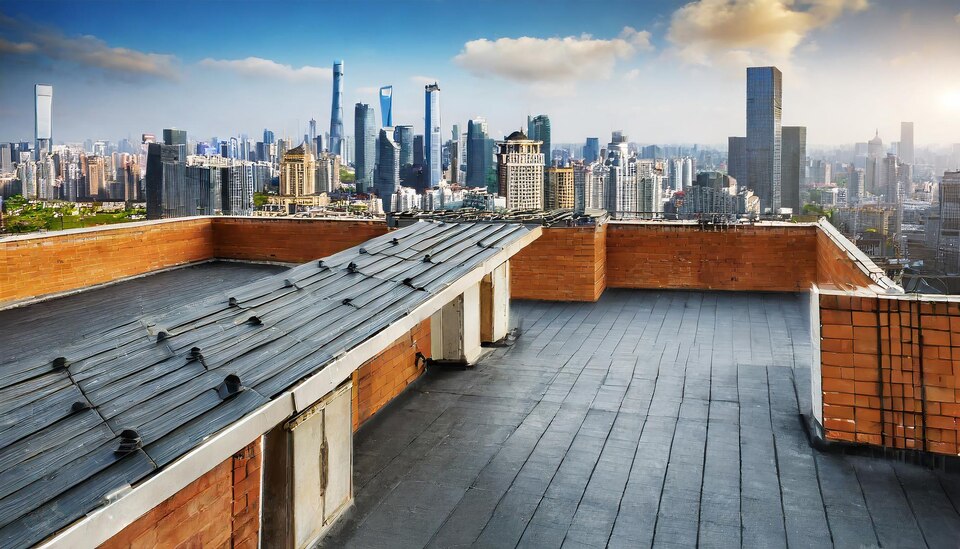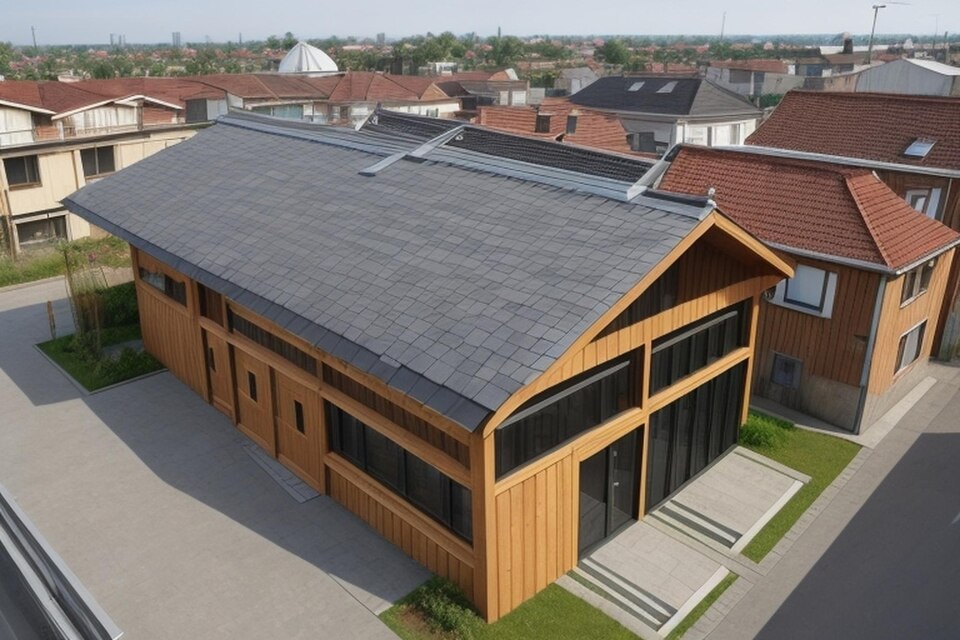What Are the Different Types of Commercial Roofs?
With many different types of roofing material, choosing the right one for your commercial building can be overwhelming. The material you choose implants not just the look of the structure, but also its energy efficiency, durability, and long-term maintenance costs.
In addition, there are numerous factors involved, including the local climate, the building’s use, and your budget. Together, let’s review this comprehensive overview of common commercial roofing systems.
We will explore various roofing options, providing insights to help inform the selection process for your property. We will discover the advantages and considerations associated with each type, aiding in a confident decision that aligns perfectly with your needs.
Built-Up Roofing (BUR)
Built-Up Roofing, commonly referred to as BUR, is a traditional method for commercial buildings. It has been used for many years and is one of the most common methods. This system involves multiple layers.
- Alternating layers of bitumen (asphalt or coal tar)
- Reinforcing fabrics called roofing felts or ply sheets.
These layers create a robust and continuous sealed surface. The surfacing of a built-up roof often includes a layer of gravel or mineral granules. These are embedded in the top layer of bitumen.
This addition offers protection from UV rays and weathering. It’s a durable option, known for its longevity. A properly installed BUR system can last for decades, it is worth thinking about.

Metal Roofing
Metal roofing is a popular choice. It stands out due to its durability, longevity, and aesthetic appeal. It is utilized on a wide array of commercial properties.
Consider these commonly used materials:
- Steel: Known for strength and resistance to corrosion.
- Aluminum: Lightweight and naturally rust-resistant.
- Copper: Offers a distinctive look, developing a natural patina over time.
- Tin: Known for their lightweight.
Metal roofs are highly resistant to fire, wind, and impact. Reflective coatings can be applied. These can help lower energy consumption. Metal roofs can reflect solar radiant heat. This reduces cooling costs in the summer.
With a life expectancy that regularly surpasses 50 years, metal roofs represent a solid long-term investment for any commercial structure. You should take note of this.
Modified Bitumen Roofing
Modified Bitumen (MB) roofing systems represent an evolution of the traditional built-up roof. Asphalt is modified with polymers. This enhances its flexibility, strength, and resistance to temperature fluctuations.
There are two main types:
- SBS (Styrene-Butadiene-Styrene): Provides a rubber-like quality, offering excellent elongation and recovery properties.
- APP (Atactic Polypropylene): Gives the asphalt a plastic-like characteristic, improving its UV resistance and aging.
MB roofing is typically applied in two or more layers. Installation methods include torch-applied, cold-applied, or self-adhered. This versatility makes it suitable for various roof designs and climates.
Do you desire a durable and weather resistant roofing?. Check this one out.
Single-Ply Roofing
Single-ply roofing membranes are prefabricated sheets. These are flexible and used as a single layer. They offer a streamlined installation process.
There are two main categories:
- Thermoset Membranes: Commonly made from EPDM (Ethylene Propylene Diene Monomer), also known as rubber roofing. EPDM is known for its resistance to weathering, ozone, and UV radiation. It remains flexible in low temperatures.
- Thermoplastic Membranes: Popular options include TPO (Thermoplastic Polyolefin) and PVC (Polyvinyl Chloride). These materials can be repeatedly softened and made pliable. They offer excellent weldability for strong seams.
Single-ply membranes are known for their lightweight nature. Reflective options are available. This can contribute to energy savings. Think about this for your building.
Green Roofing
Green roofing systems, also called vegetative roofs. These are becoming increasingly popular. This is due to their environmental benefits and aesthetic appeal. They feature a layer of living vegetation. This is planted over a waterproofing membrane.
Green roofs can be:
- Extensive: Shallow soil depth, supporting low-maintenance plants like sedums and mosses.
- Intensive: Deeper soil, capable of supporting a wider variety of plants, including shrubs and small trees.
Green roofs provide natural insulation. This helps regulate building temperature and reduces energy costs. They absorb rainwater. This lessens runoff and the strain on drainage systems. They also create habitats for wildlife. They improve air quality, too.
It is a really special option for your property.
Spray Polyurethane Foam (SPF) Roofing
Spray Polyurethane Foam (SPF) roofing is a seamless, insulating roofing system. It is applied as a liquid. This expands into a rigid foam. It creates a monolithic layer.
SPF offers:
- High Insulation Value: Reduces heat transfer, lowering energy consumption.
- Waterproofing Capabilities: The closed-cell structure of the foam prevents water penetration.
- Lightweight Design: Reduces the structural load on the building.
SPF is adaptable to various roof shapes and substrates. Protective coatings are applied over the foam. This shields it from UV degradation and weather elements. This is important for durability.
With a qualified installer, your roof will last longer.
Shingle Roofing.
Shingle roofing, although more common in residential construction, is sometimes applied in commercial projects. Especially when a specific architectural style is desired. These systems consist of overlapping individual elements, typically made of asphalt, but options like wood, slate, or composite materials are also available.
Shingles provide an attractive look, and their modular design allows for easier repair or replacement of damaged sections. However, they might not offer the same level of durability and weather resistance as other commercial roofing types, and their suitability depends heavily on the building’s slope and local climate conditions.
- Asphalt shingles: Are your more common option.
- Composite materials: Known for versatility.
PRO TIP: Apex Commercial Roofing LLC also offers the roofing materials TPO, EPDM, Silicone Roofing, and Rubber Roofing. We would love to work with you to find the best roofing material for your building.
Choosing the correct roof.
The best choice of the commercial roofing depends on particular aspects. These include the building’s design, geographic location, budget constraints, and long-term goals. Each roofing system features its own distinct advantages and trade-offs regarding cost, maintenance requirements, environmental impact, and expected lifespan.
Consulting with a qualified roofing professional like Apex Commercial Roofing LLC is highly recommended, as they can assess your needs and guide you towards the most suitable option. Remember to prioritize quality installation and regular maintenance to maximize the performance and longevity of any roofing.
Apex Commercial Roofing LLC offers professional roofing services for commercial building needs. Contact us today at +1 856 203 6108 or +1 800 231-2941 to schedule your free roofing inspection.
What Are the Different Types of Commercial Roofs?
Selecting a commercial roofing system is an important decision. It involves careful consideration of many factors. A wrong choice could have repercussions for years.
From the traditional durability of built-up roofing to the modern appeal and energy efficiency of metal, single-ply, and green roofs, the options are diverse. If you need any additional information, don’t hesitate to look for it. Understanding the unique characteristics of each system, and its suitability for your building’s requirements, is essential. In the end, the best roof is the one that fits perfectly with your unique needs and budget. After exploring the different types of commercial roofs, hopefully, you have a clearer vision.
At Apex Commercial Roofing LLC, we are committed to delivering top-notch results for all your roofing needs in New Jersey, New York, and Pennsylvania.
Come check us out at 811 Church Road, Cherry Hill, NJ 08057.
Visit Apex Commercial Roofing LLC at Our Cherry Hill Location
811 Church Rd #105,
Cherry Hill, NJ 08002,
United States
For professional roofing services from a reliable commercial roofing contractor and commercial metal roof repair, we invite you to stop by or reach out to us.







